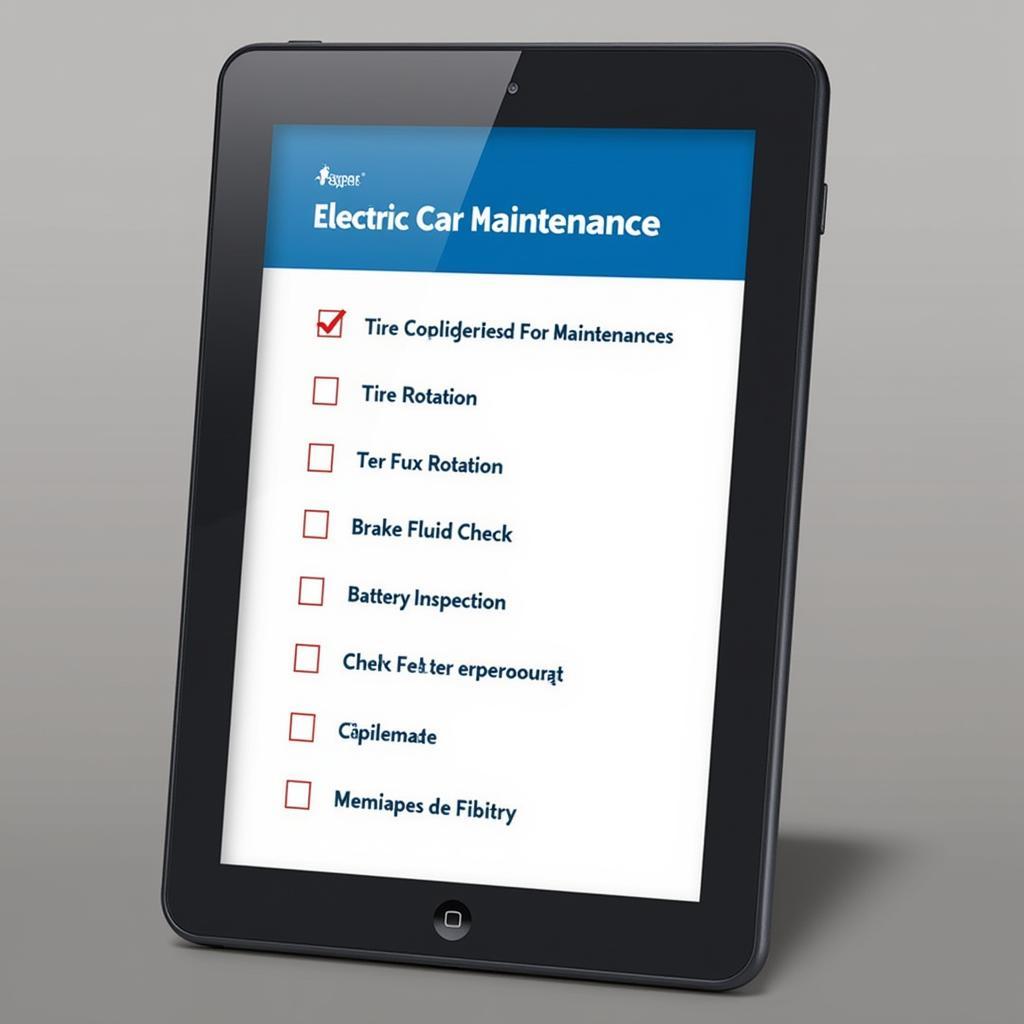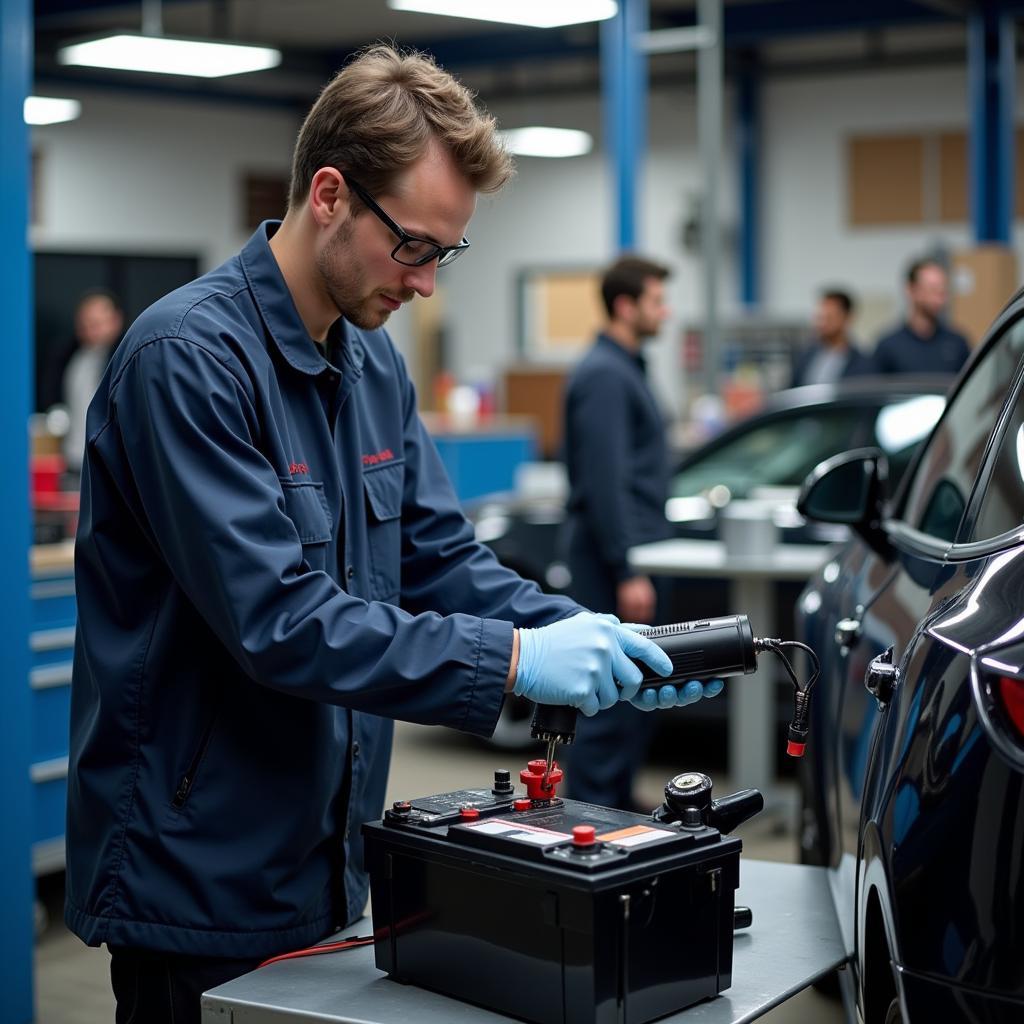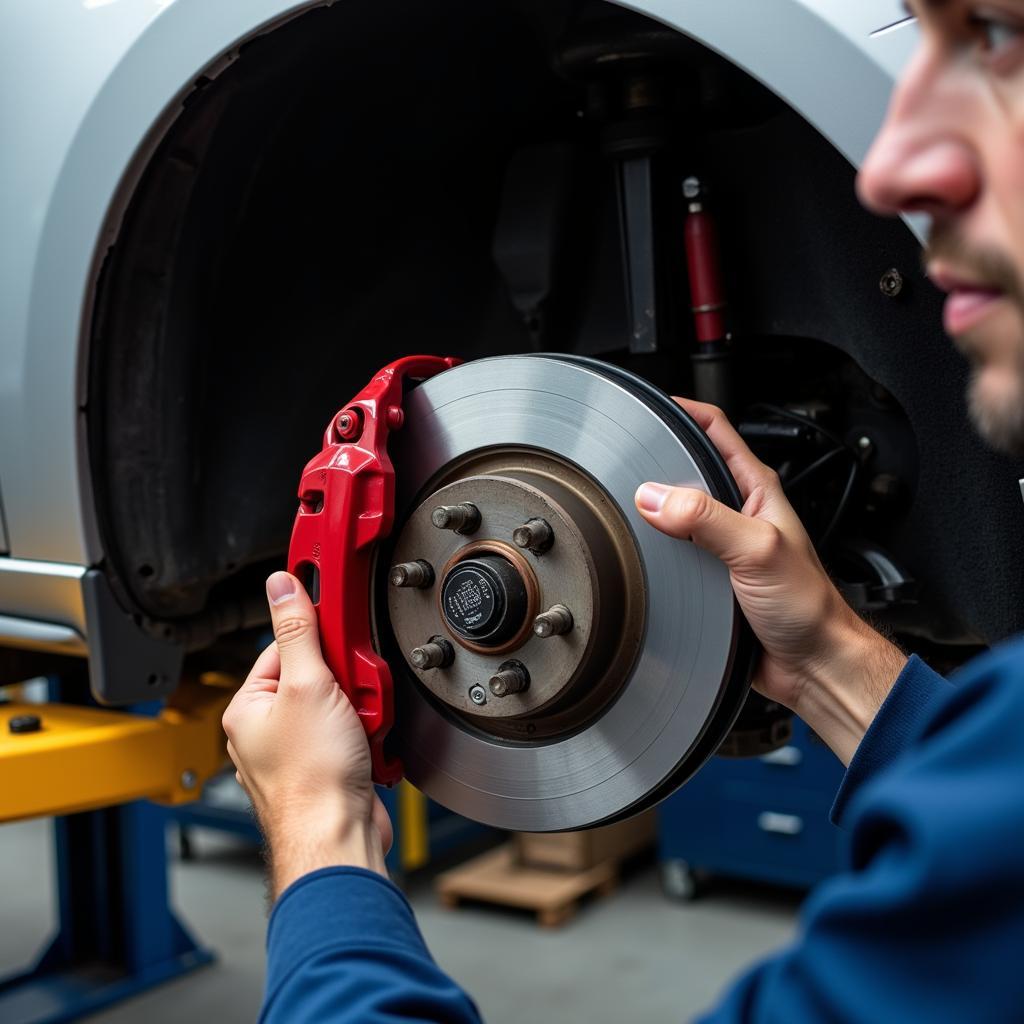The electric revolution is here, and with it comes a new era of car ownership. While the prospect of ditching gas stations and embracing sustainable driving is exciting, many people wonder, “What Type Of Maintenance Does An Electric Car Need?”
It’s a fair question. Electric cars are mechanically different from their gasoline-powered counterparts, leading to a common misconception that they’re maintenance-free. While it’s true they require less upkeep, electric cars still need regular attention to ensure optimal performance and longevity.
 Electric Car Maintenance Checklist
Electric Car Maintenance Checklist
Key Differences in Electric Car Maintenance
One of the most significant advantages of electric cars is the simplicity of their powertrain. With far fewer moving parts compared to a traditional combustion engine, many components that wear down in a gas car are simply absent in an EV.
Here’s a breakdown of what you don’t need to worry about with an electric car:
- Oil changes: Say goodbye to regular oil changes! Electric cars don’t use engine oil, eliminating the need for oil changes, oil filters, and related components.
- Spark plug replacements: No more spark plugs to replace! Electric cars ignite the air-fuel mixture in the engine cylinders using an electric spark, so no spark plugs are required.
- Exhaust system maintenance: Electric cars produce zero tailpipe emissions, meaning you can forget about expensive exhaust system repairs or replacements.
Essential Maintenance for Your Electric Vehicle
While the absence of traditional engine maintenance is a huge plus, there are still essential tasks to keep your electric car running smoothly. Here’s what you need to know:
1. Battery Care is Crucial
The battery is the heart of your electric car, and proper care is essential for its performance and lifespan.
- Avoid extreme temperatures: Extreme heat or cold can impact battery performance and longevity. If possible, park in a garage or shaded area.
- Don’t fully discharge or overcharge: While modern EVs have sophisticated battery management systems, it’s best to avoid fully depleting or consistently charging to 100%. Aim for a charge between 20% and 80% for daily use.
- Schedule regular battery checks: Consult your owner’s manual for the recommended battery check intervals. A qualified technician can assess the battery’s health and identify any potential issues early on.
 Technician Inspecting Electric Car Battery
Technician Inspecting Electric Car Battery
2. Tire Maintenance Matters
Electric cars, especially high-performance models, can put significant torque on tires. Regular tire maintenance is vital for safety and efficiency.
- Rotate tires regularly: Follow the recommended tire rotation schedule in your owner’s manual. This ensures even wear and tear, extending tire life.
- Maintain proper tire pressure: Check your tire pressure monthly and adjust as needed. Proper inflation improves handling, fuel efficiency, and tire longevity.
3. Brake System Needs Attention
While regenerative braking in EVs reduces wear on traditional brake pads, the entire brake system still requires periodic maintenance.
- Brake fluid flushes: Consult your owner’s manual for recommended brake fluid flush intervals. This ensures optimal brake performance and prevents corrosion within the system.
- Brake pad inspection: While brake pads in EVs typically last longer, have them inspected regularly to ensure they’re wearing evenly and within safe limits.
 Mechanic Checking Car Brakes
Mechanic Checking Car Brakes
4. Cabin Air Filter Replacement
Just like any car, electric vehicles need fresh air inside the cabin.
- Replace cabin air filter: Refer to your owner’s manual for the recommended replacement interval. A clogged cabin air filter can reduce airflow and impact HVAC efficiency.
5. Software Updates
Electric car manufacturers frequently release software updates that can improve performance, efficiency, and even add new features.
- Install software updates promptly: Always install software updates as soon as they’re available to benefit from the latest improvements.
Cost Savings with Electric Car Maintenance
One of the most appealing aspects of electric car ownership is the potential for significant savings on maintenance. Without the need for oil changes, spark plug replacements, and exhaust system repairs, you’ll save money in the long run.
car maintenance and repair costs per year can vary widely depending on the make and model of your vehicle, but electric cars generally have lower maintenance costs compared to their gas-powered counterparts.
Expert Insight:
“Many people are surprised to learn that electric car maintenance can be significantly cheaper than maintaining a gasoline car,” says John Smith, a certified electric vehicle technician with over 15 years of experience. “The lack of a traditional engine and its associated components translates to fewer parts that require regular service or replacement.”
FAQs about Electric Car Maintenance
Q: How often do I need to charge my electric car?
A: Charging frequency depends on your driving habits and the range of your electric car. Most EV owners charge their cars overnight at home, while others may need to top up at public charging stations during the day.
Q: Can I service my electric car myself?
A: While some routine maintenance tasks like checking tire pressure can be done at home, it’s recommended to have your electric car serviced by a qualified technician, especially for tasks involving the battery or electrical system.
Q: Do electric cars need coolant?
A: Yes, electric cars still use coolant, but not for the engine. The battery pack, electric motor, and power electronics require a separate cooling system to prevent overheating.
Q: How long do electric car batteries last?
A: Electric car batteries are designed to last for many years and miles. Most manufacturers offer warranties of at least 8 years or 100,000 miles on their battery packs.
Q: What is regenerative braking?
A: Regenerative braking is a system that captures energy typically lost during braking and uses it to recharge the battery, improving efficiency.
Conclusion
Electric cars offer a compelling alternative to traditional gasoline-powered vehicles, and understanding their maintenance needs is crucial for a smooth and enjoyable ownership experience. While they require different care than gas cars, the reduced maintenance and potential cost savings make them an attractive option for environmentally conscious drivers. If you have any questions or require assistance with your electric car maintenance, don’t hesitate to contact AutoTipPro at +1 (641) 206-8880 or visit our office at 500 N St Mary’s St, San Antonio, TX 78205, United States. Our team of experts is here to help!




Leave a Reply